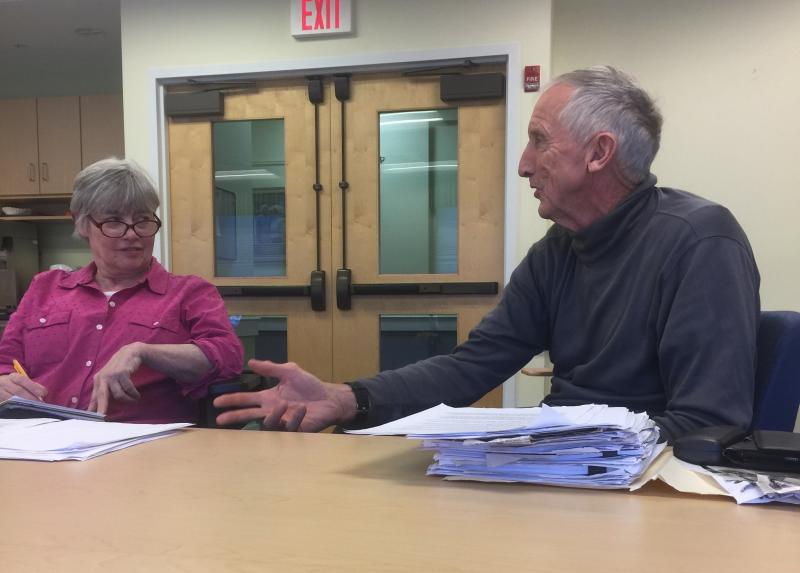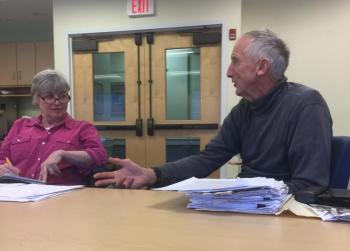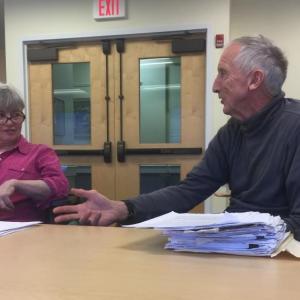Housing committee discusses developments, data
The Housing Committee on Oct. 17 discussed a meeting Chair Katie Spencer White and other members had with Eagle Point Companies' President and CEO Laura Burns and Vice President Jennifer Dionne. The group asked Burns and Dionne what the committee should know about its local housing market, which would help in finding short- and long-term solutions for affordable housing.
Member Wendy Wolf said she had the feeling though Burns and Dionne may be able to help in the distant future, their company’s experience as tax credit developers in communities and projects larger than the Boothbay region makes them equipped to find a higher level of data than what the region needs.
Said Wolf, “What I walked away with … is that most analyses that would look at inventory or kind of the data you would need to go to Maine Housing or whatever is fairly broad brush and doesn't answer the question … (that) we don't know what solution to design because we don't know our target market … We need to have some of that very tangible data in our fingertips so we're not pursuing and designing the wrong things.”
Former New Hampshire developer and committee member Mike Reed agreed Burns and Dionne make a good resource, but he does not think the first attempt with housing issues is a tax credit project. Based on data from a survey members Ted Repa and Patricia Royall are conducting, full-time wages put the average Boothbay region employee beyond the criteria for a tax credit project, Reed said. He said any project of less than 25 units would not be economical, and any project would likely take at least five to seven years.
“If we are trying to do something as an offshoot of the JEDC report to find housing to meet and expand employment in the area, tax credit property will most likely, unless it's a single employee coming at the lower range would fit, but a family most likely wouldn't because how many families don't have two incomes?"
Member Dale Lancaster agreed with Reed and said Lincoln County does not score high on the criteria for tax credit development, making it hard to attract investors to projects.
“If I was a developer just moving into Maine and looking at their qualified allocation plan, Lincoln County is not where you'd look for a site to do a tax credit project … To me, this sounds like a rural development. That's where we should go – try for one of the (USDA Section) 515 demonstration plans or something through rural development and not Maine Housing.”
Lancaster said smaller projects are more likely to do that with the possibility of around 95 percent financing. This would let private investors become involved with incentives for “tax losses instead of the credits.”
Boothbay Region Community Resource Council Community Navigator Kathleen Arabasz said the committee also needs to be careful about how it defines needs and families. “When you throw out the $39,360 for a family of four, it just reminds me of a client who came through our door and that just happened to be what her salary was … She was over income for subsidized housing … She had a good job here on the peninsula and was looking at moving off of it in order to find a place to live.”
Repa said his concern is if the committee does not see to it that someone, somewhere gets a shovel in the ground, it will be like every other attempt at dealing with affordable housing. The ongoing Habitat for Humanity project on Campbell Street is a success in the works, said Repa, but he said employers have told him they are not waiting for a housing committee to fix the housing shortage issue.
“(They've) said 'We're not waiting for you. We've got to deal with it ourselves, so we're going to acquire a property, we're going to convert it, and (that's) going to make it harder for lower income people to find housing,'” said Repa. “We've got to increase the ply and I don't think that we need another study to focus on increasing the supply. I would focus on developing more alternatives.”
Lancaster said he agreed a market study would be a waste of time. He said immediate action is needed, and markets can change by the time a study is complete. "It's a stamp on what your intuition is, it's not a science."
“Are we suggesting that 'If we build it they will come,'” White asked. “… Stop naval gazing and start building?”
“Yes,” said Repa, explaining, because needs vary by incomes, families and employment, there is a need for everything. "There is a demand for every type of housing we can think of. We have a housing shortage in this community … I'm just arguing to start somewhere.”
Reed suggested that after Repa and Royall's survey is complete, the committee may want to bring together all the employers interviewed, for an honest discussion about the needs of the community. Boothbay Region YMCA Executive Director and committee member Andy Hamblett disagreed.
“I am one of those employers and it's not for me to tell you what I need to provide, it's for my employees to say what they want and where they want to be,” said Hamblett. “Part of it may be the size of your family. It's not just your income. I thought when we were talking about a market study, it wasn't something that's for tax credits or any of that stuff, but that it is really to … ask employees what it is that would get them to be here … It's not at the Andy Hamblett level, we're talking to the people …”
Event Date
Address
United States

























